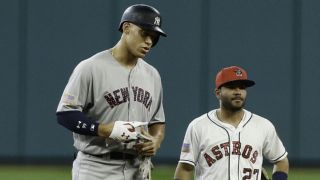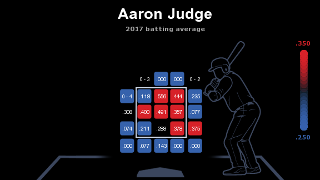|
We could have had our first matchup of 100-win teams in a League Championship Series since the Yankees played the Royals in 1977, but the New York Yankees pulled off an improbable series comeback against the Cleveland Indians after losing the first two games. While the Houston Astros won 101 regular-season games to 91 for the Yankees, the true talent levels of the teams are much closer than the win-loss records suggest. The Yankees had a plus-198 run differential compared to Houston's plus-196. Both teams made some crucial trade acquisitions along the way, deepening both rosters. Here's a look at some key issues in the series: Astros fastball hitters versus Yankees fastball pitchers If today's game is all about power hitting and power pitching, then this is the ultimate matchup: The Astros lineup versus that imposing Yankees bullpen. The Astros not only led the majors in batting average and isolated power, they did it while possessing the lowest strikeout rate in the league. They hit .301/.373/.525 against fastballs, best in the majors, and also had the lowest strikeout rate against fastballs. Against the Red Sox, they hit .333 with eight home runs in four games, so they're also coming off a big series on offense. Their top fastball hitters: Marwin Gonzalez: .361/.422/.664 Jose Altuve: .362/.439/.605 George Springer: .324/.413/.604 Carlos Correa: .329/.409/.590 So that's a fearsome foursome. The Yankees counter with this group, with average fastball velocity in the postseason: Aroldis Chapman: 100.4 mph Luis Severino: 98.2 mph Dellin Betances: 97.8 mph Tommy Kahnle: 97.6 mph Chad Green: 96.6 mph Severino is the only starter in the group -- he was the hardest-throwing starter in the regular season, and he started Game 4 against the Indians, when the Yankees didn't throw a single fastball slower than 96 mph. The list doesn't even include David Robertson, who checks in with a 92 mph cutter and wipeout curveball and came up huge in both the wild-card game with 3⅓ scoreless innings and the clincher against the Indians with 2⅔ scoreless innings. Heck, it doesn't include Adam Warren, who posted a 2.35 ERA and is the sixth guy out of the pen on this team. So how do you attack the Astros? Here's a key to the Houston approach: They had the second-lowest rate of pitches per plate appearance. Here's the hard part, however: That doesn't mean they go up there hacking just to make contact. They were middle of the pack (15th) on swing rate on an 0-0 count. What they're really good at is hunting out those fastballs. They even hit .280/.357/.467 against 95-plus heat. Oh, then there's this: They also had the best wOBA and lowest strikeout rate in the majors against offspeed pitches.  How will A.J. Hinch manage his bullpen? How will A.J. Hinch manage his bullpen?
Bringing in Justin Verlander in Game 4 -- with a series lead and Verlander scheduled to start Game 5 -- felt a little bit like a panic move, especially given Verlander had never pitched in relief, so it makes you wonder how Hinch views the state of his bullpen right now. Francisco Liriano, Lance McCullers Jr., Chris Devenski and Joe Musgrove all appeared in Game 3 and gave up runs, which somewhat explains the Verlander move. Managers have a very short memory in the postseason. Devenski is going to be a key guy here. His killer changeup means he has a big platoon split, holding lefties to a .111 average and .414 OPS while righties hit .238 with a .762 OPS. His rate stats other than his ERA also declined after he made the All-Star team with a monster first half: First half: .517 OPS, 2.5 percent HR rate, 5.29 SO/BB ratio
Second half: .719 OPS, 5.3 percent HR rate, .217 SO/BB ratio So while Devenski was a multi-inning weapon in the first half, he almost looks like a matchup guy now, one that you want to avoid using against right-handed power bats. Will Harris has a 2.30 ERA over three seasons with the Astros but missed all of July and August because of a shoulder issue. He did return to fan 13 batters in 10⅔ innings down the stretch, and his fastball velocity was right at his season average of 91.6 mph, so he seems healthy. He made one appearance against the Red Sox, giving up two hits in two-thirds of an inning. McCullers was another All-Star, then came down with a bad back and was put in the bullpen for the playoffs. He also had a sizable reverse platoon, with lefties posting an OPS 159 points lower against him than righties. The team's best reliever the final two months other than closer Ken Giles was actually Musgrove, who had a 1.37 ERA with five walks, 26 strikeouts and two home runs in 26⅓ innings. He threw 92-93 mph as a starter, but 95 as a reliever. The point here: Managers want to hand the important innings to their top relievers, and while all these guys are potentially good options, it's not exactly clear how Hinch will deploy them and in what order. The Astros' MVP candidate Altuve had a three-homer game against the Red Sox, plus a two-hit game and a three-hit game. The Red Sox even intentionally walked him twice to pitch to cleanup hitter Correa. How do you pitch to Altuve? He doesn't exactly have a hole in his strike zone:  Like all hitters, your best hope is to get ahead in the count, as he hit .479 in hitter's counts. But if you make that first pitch too good, he'll swing: He hit .449 on a 0-0 count, with 29 percent of his plate appearances ending after the first pitch. Oh, and against the really hard stuff? He hit .385 against pitches of 96 mph or faster. Like all hitters, your best hope is to get ahead in the count, as he hit .479 in hitter's counts. But if you make that first pitch too good, he'll swing: He hit .449 on a 0-0 count, with 29 percent of his plate appearances ending after the first pitch. Oh, and against the really hard stuff? He hit .385 against pitches of 96 mph or faster.
The Yankees' MVP candidate Aaron Judge, on the other hand, went 1-for-20 against the Indians with 16 strikeouts, a record for one series. He does have a couple of small holes in his plate coverage, up and away and low away, so your best hope is to get him to chase something off the plate:  The Indians were able to do that, pitching him on the edges and making their two-strike pitches. Thirteen of the 16 strikeouts came on 2-2 or 3-2 counts. Judge's overall swing rate was similar to the regular season -- 37 percent against the Indians compared to 41.1 percent -- and his chase rate basically the same. He was just missing some tough pitches when he did swing, with a 51 percent miss rate (34.9 percent in the regular season). Call it a little five-game slump, but it didn't seem to be the result of a flawed approach. The Indians were able to do that, pitching him on the edges and making their two-strike pitches. Thirteen of the 16 strikeouts came on 2-2 or 3-2 counts. Judge's overall swing rate was similar to the regular season -- 37 percent against the Indians compared to 41.1 percent -- and his chase rate basically the same. He was just missing some tough pitches when he did swing, with a 51 percent miss rate (34.9 percent in the regular season). Call it a little five-game slump, but it didn't seem to be the result of a flawed approach.
The starting pitchers On paper, this is Houston's big advantage, with Dallas Keuchel and Verlander slated to start the first two games. Brad Peacock didn't have great results in his playoff start but had some bad luck on balls in play in that game. He did have a great stretch of starts the final two-plus months, giving up two or fewer runs in 10 of 13 starts. Charlie Morton is no longer a sinkerballer looking to get ground ball outs, but a guy with a 95 mph fastballs and big curveball. The Yankees have a couple of options in the first two games. They could skip Sonny Gray and go with Masahiro Tanaka and Severino on regular rest, pushing Gray all the way back to Game 4, lining up CC Sabathia to start Game 3 and a potential Game 7. The surprising part of the Yankees' win over the Indians was that Girardi didn't actually utilize a quick hook with his starters. Tanaka pitched seven innings in a 1-0 Game 3 victory. Severino also pitched seven innings in Game 4, albeit with a bigger lead. Girardi let Sabathia give up four straight hits in the fifth inning of Game 4, turning a 3-0 lead into a 3-2 lead. If Robertson doesn't escape the jam with a double play on Francisco Lindor, that game might turn out a lot different and Girardi's slow hook with a rested bullpen would have been as controversial as his Game 2 replay blunder. The Astros, however, have a much stronger lineup than the Indians. Girardi might have to manage his bullpen with a little more urgency in this series. That includes the first two games. With starters Jaime Garcia and Jordan Montgomery also in the bullpen, Girardi can have a quick hook knowing he has two potential long guys if needed to mop up some innings and save his other guys. Likewise, while Hinch will understandably have a longer leash with Keuchel and Verlander, he had very quick hooks with Peacock and Morton, even though the Astros were up in the series in those games. Prediction Chapman looks unhittable right now and while the pen had that one hiccup in Game 2 against the Indians, it's so deep and so good that the Astros are going to have to score runs off the Yankees starters to reach the World Series. That's what they did against Boston, scoring 16 runs in 11⅓ innings against the Red Sox rotation. They do it again, taking the series in six games, with Verlander pitching a gem in the clincher.
|
